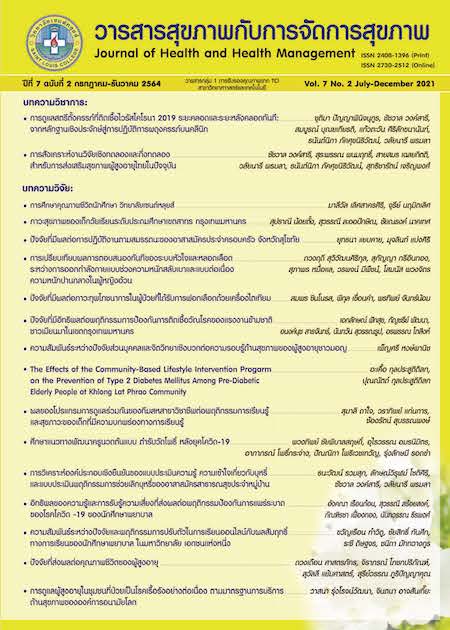A Research Synthesis of Quasi and Experimental Studies for Thai Elderly Health Promotion at Currently
Keywords:
health promotion in new normal, health promotion in next normal, Thai elderlyAbstract
This article aimed to synthesize knowledge for enhancing health care competence among Thai elderly. Using PICOD-T for systematic search and analysis, this paper synthesized nine (9) qualified researches as inputs. The analysis results found that: 1) Most health programs in the synthesized researches are comprised of mixed models that focus on developing knowledge; 2) Activities include giving advice and teaching knowledge in a structured and concrete manner (the pattern involves demonstration, practice of health promotion, follow-up and assessing health conditions, coaching on health promotion and involving family and friends in promoting health); 3) Technology and online media are tapped to promote health. 4) Results are measured before and after joining the program (which include knowledge, perception, behavior, clinical outcome indicators, quality of life, diet, physical performance, balance, sleep, brain function, psycho-emotional and psychosocial behavior); 5) Popular theories and concepts include: Pender's Health Promoting Theory, Health Belief Model Theory, Social Support Concept, Health Belief Model and Empowerment for Health Promotion; 6) The overall readiness of the body is assessed by monitoring blood pressure, pulse, sugar level, chest pain, exacerbation and other abnormalities during the program. Recommended to use Telenursing for Teaching knowledge and following up on self-health promotion behaviors of the elderly in the next normal.
References
คณะกรรมการจริยธรรมการวิจัยในมนุษย์ วิทยาลัยพยาบาลบรมราชชนนี นพรัตน์วชิระ. (2561) . วิธีดําเนินการมาตรฐานงานจริยธรรมการวิจัย. ฉบับที่ 4. สืบค้นเมื่อ 22 ธันวาคม 2564, จาก https://drive.google.com/file/d/12IpcNwBloKRyv0n2WAeWS5Uxc4nN0yKV/view
จารุวรรณ ก้านศรี ชุติมา มาลัย นภัทร เตี๋ยอนุกูล ภัทรวดี ศรีนวลและนภัสสร ยอดทองดี. (2563). ประสิทธิผลของโปรแกรมการส่งเสริมสุขภาพจิตต่อภาวะสุขภาพจิตของผู้สูงอายุ. วารสารวิจัยสุขภาพและการพยาบาล, 36(2), 95 -107.
ชวนพิศ เจริญพงศ์ อลิสา นิติธรรม สุพัฒน์ ธีรเวชเจริญชัย สายสมร เฉลยกิตติ. (2562). การพัฒนาโปรแกรมส่งเสริมพฤติกรรมสุขภาพผู้ป่วยโรคความดันโลหิตสูงชนิดปฐมภูมิ. วารสารพยาบาลทหารบก, 20(1) 157-164
ดวงใจ เปลี่ยนบํารุง. (2557). ผลของการส่งเสริมสุขภาพผู้สูงอายุโดยผ่านกลุ่มผู้นําชุมชน. วารสารการพยาบาลและการดูแลสุขภาพ, 32(3), 77 – 85.
บังอรศรี จินดาวงค์ และ ปิยธิดา คูหิรัญญรัตน์. (2564). ผลของโปรแกรมการสนับสนุนทางสังคมต่อพฤติกรรมการส่งเสริมสุขภาพของผู้สูงอายุในชุมชน. วารสารวิจัย มข. (ฉบับบัณฑิตศึกษา), 21(1), 229-241.
ปัทมา ผาติภัทรกุล ผุสดี ก่อเจดีย์ พเยาว์ พงษ์ศักดิ์ชาติ ศิริธร ยิงเรงเริง ชุติมา บูรพา ประภาส จักรพล. (2561). ประสิทธิผลโปรแกรมส่งเสริมสุขภาพต่อพฤติกรรมสุขภาพของผู้สูงอายุในชุมชน. วารสารวิจัยทางวิทยาศาสตร์สุขภาพ, 12 (ฉบับพิเศษ), 52 – 60.
พเยาว์ พงษ์ศักดิ์ชาติ ผุสดี ก่อเจดีย์ เกศแก้ว สอนดี และ จันทร์พร โชคถวาย. (2561). ผลของโปรแกรมเสริมสร้างพลังอำนาจต่อการรับรู้ความสามารถในการส่งเสริมสุขภาพผู้สูงอายุของเครือข่ายสุขภาพชุมชนจังหวัดสระบุรี. วารสารการพยาบาลและการดูแลสุขภาพ, 31(4), 33 – 41.
ศรุตยา หาวงษ์ วีณา เที่ยงธรรม และ สุธรรม ฉันทมงคลชัย. (2560). ผลของโปรแกรมส่งเสริมสุขภาพผู้สูงอายุกลุ่มเสี่ยงต่อภาวะสมองเสื่อมในชุมชนโดยการมีส่วนร่วมของครอบครัว. วารสารพยาบาลสาธารณสุข, 31(1): 110 -128.
สุนทรียพันธ์ อ่อนสีแดง จตุพร เหลืองอุบล และรณรุทธ์ บุตรแสนคม. (2558). ผลของโปรแกรมการส่งเสริมสุขภาพต่อพฤติกรรมการป้องกันโรคของผู้สูงอายุวัยกลาง ตำบลทุ่งกุลา อำเภอสุวรรณภูมิ จังหวัดร้อยเอ็ด. วารสารทันตภิบาล, 26(1), 91-101.
Bandura, A. (1994). Self-efficacy. In V. S. Ramachaudran (Ed.), Encyclopedia of human behavior (Vol. 4, pp. 71-81). New York: Academic Press. (Reprinted in H. Friedman [Ed.], Encyclopedia of mental health. San Diego: Academic Press, 1998).
Elton, J., & O'Riordan, A. (2016). Healthcare disrupted: Next generation business models and strategies. John Wiley & Sons.
Holly C, Salmond S, Saimbert M. Comprehensive systematic review for advanced.practice nursing. 2nd ed. New York: Springer Publishing Company; 2017.
Melnyk BM, Fineout-Overholt E. Evidence-base practice in nursing and health care: a guide to best practice. 4nd ed. Philadel phia: Lippincott William & Wilkins; 2019.
Muthuppalaniappan, M., & Stevenson, K. (2021). Healthcare cyber-attacks and the COVID-19 pandemic: an urgent threat to global health. International Journal for Quality in Health Care, 33(1), mzaa117.
Pender NJ, Murdaugh CL, Parsons MA. Health promotion in nursing practice. 5th ed. Jurong, Singapore: Pearson; 2006.
Polit DF, Beck CT, Hungler CT. Nursing research: generating and assessing evidence for nursing practice. 10th ed. Philadelphia: Wolters Kluwer; 2017.
Palmieri, P. A., Peterson, L. T., & Noeding, M. N. R. (2015). Health information technology: Anticipating, recognizing, and preventing disruptions in complex adaptive healthcare systems. In Healthcare Administration: Concepts, Methodologies, Tools, and Applications (pp. 1-22). IGI Global.
Terry, O. (2020). Disruption Innovation and Theory. Journal of Service Science and Management, 13(03), 449.
Tursunbayeva, A. (2019). Human resource technology disruptions and their implications for human resources management in healthcare organizations. BMC health services research, 19(1), 1-8.
Wongsaree,C., Sritoomma,N., Luangamomlert, S. (2021). Development of Indicators of the Personal Initiative Behavior of Head Nurses at Private Hospitals in Thailand. Journal of public health and development. JPHD, 19 (1): 152-163.
World health organization. (1986). Ottawa charter for health promotion, 1986 (No. WHO/EURO: 1986-4044-43803-61677). World Health Organization. Regional Office for Europe.
Downloads
Published
How to Cite
Issue
Section
License
Copyright (c) 2021 Journal of health and health management

This work is licensed under a Creative Commons Attribution-NonCommercial-NoDerivatives 4.0 International License.




